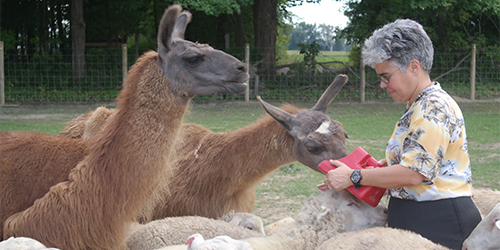By AJ Trager

Angie Martell. BTL Photos: AJ Trager
CHELSEA – Following a path that has taken her from working in civil rights in the big metropolis of New York City to owning dozens of sheep, chickens, pigs and other rowdy farm animals, Angie Martell seeks a full life of balance and tranquility.
She and her partner, Kelly, have been together for nearly 20 years and have over 150 animals on their farm. Martell passes her free hours helping Kelly who works days, nights and weekends, while tending squawking and hopping characters. In 2011, the couple moved from NYC with their two children to the small town outside of Ann Arbor.
Martell is a holistic lawyer working in divorce and family law, business, criminal defense, estate planning and elder law, LGBT issues, civil litigation, employee rights, workers' compensation and immigration law. She wants to shift the mindset from the old realities into a more natural and spiritual way of relating to the nature of law and people. She sees conflicts as opportunities for growth.
"The old worldview of how things have always been done doesn't work," Martell wrote in an Op Ed this summer. "The holistic approach focuses on the whole person and the whole problem in order to find more healthy and sustainable legal solutions."
The lawyer and daughter of two deaf parents grew up in poverty in the South Bronx and has lived in the city for most of her life. Prior to college, Martell was homeless before she lived with a teacher who convinced her to go to school.
"At the time I said 'Well, if there is room and board, I'm there,'" Martell notes.
She studied Spanish literature at New York University where she received her bachelor's degree and went on to get her master's degree in media studies from The New School for Social Research in Manhattan. Martell wasn't yet done with school, and after receiving her master's degree from the City University of New York School of Law, the llama caretaker finally finished her school path receiving a graduate degree from Harvard.
Martell is a Reiki professional, meaning that she works hard at incorporating positive energy into her work, both in her law practice and at home. A lot of her life is about energy healing and she often finds herself meditating with the animals on the farm. Martell doesn't "own" any of the creatures she takes care of; they are under her care, on a journey with her into the next day.
"The animals really teach me how to be a better person and a better lawyer. Whatever issues they have between one another, they learn to get along and figure it out. You learn from them what is important, what is not, how to get along in life and how to really be with the land. When I am out there, despite what is going on in my life, they always teach me something," Martell says.
Not every animal on the land gets along, but the small community makes it work. The two male rams, for example, are kept apart because they would butt heads. The sheep, all named after famous women like Hilary Clinton and Anne Frank, the mini-goats and two llamas are all free to roam in one area.
Dolly the llama is Martell's favorite animal on the farm. She got him almost two years ago with the purpose of being a guard, watching over the sheep and goats that are susceptible to attacks from coyotes and other predators. For added protection, she has installed an electrical fence.
Other animals on the farm had like-companions, and soon Martell realized that Dolly seemed lonely. That's when she got Abby. Both llamas come from the same Michigan locale. And like many relationships, they had to figure out who was going to be the dominant partner. "Abby is clearly the one in charge," Martell laughed.
She connects best with Dolly because he comes from Latin America. Martell is Puerto Rican and her heritage is very important to her.
"I identify with Dolly in many ways because he is there to help the rest of the flock find balance, and I feel that is what I try to do in my life, help others find their way," Martell said. "If you look into his eyes, you really see the soul."
Kelly works the land the hardest and spends the daylight hours feeding, milking and tending to the animals. They're working to produce their own goat cheese from the goat's milk that they are already harvesting and have set up a creamery in what used to be the garage. The environment that the couple has is always changing, whether through expanding the roaming area for the herd or through building their home by adding new personalities to the farm.
Moving to Michigan was a bit of culture shock for Martell. In the city, she rarely drove, and she was scared to find some Michigan speed limits reach 70 mph. But while Michiganders might drive fast, NYC is known for its own characteristics that differ from the Midwest.
"Being from the east coast, people say I talk loud. Cannot say if that's because I am Puerto Rican or a New Yorker. Midwesterners are more reserved. But what the Midwest has to offer is the people are so generous, open, honest and forgiving, and it has an amazing energy… and the connection with farming. I have come to respect farmers in way that I never thought I would. It's a hard job," Martell says.
She's always been an "out" lesbian and jokingly mentions that she knew at the age of five that she liked girls. The most difficult thing about moving to Michigan was the prejudice and harassment she has seen her kids go through.
"Having your kids be bullied because they have two moms or being treated like second-class citizens because of our marital status is one of the hardest things," Martell shares. "The biggest challenge is standing up and saying 'I am a lesbian and I will always be a lesbian, and I'll be here for the community.'
She's confident that Michigan's laws will change and is seeing a shift in the minds of legislators and community members.
"I really am fortunate that this holistic peace has come together," says Martell. "Fortunate that I meet interesting people all along the journey that open my eyes to things that I want as part of my life and have helped me along the way. The next piece is all about… well who knows? We'll see. But I love living in the area and being a part of the group."










